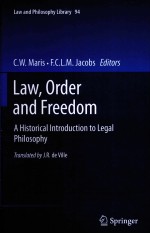图书介绍
LAW ORDER AND FREEDOMPDF|Epub|txt|kindle电子书版本网盘下载

- JACQUES DE VILLE 著
- 出版社: SPRINGER
- ISBN:9400714564
- 出版时间:2011
- 标注页数:388页
- 文件大小:20MB
- 文件页数:402页
- 主题词:
PDF下载
下载说明
LAW ORDER AND FREEDOMPDF格式电子书版下载
下载的文件为RAR压缩包。需要使用解压软件进行解压得到PDF格式图书。建议使用BT下载工具Free Download Manager进行下载,简称FDM(免费,没有广告,支持多平台)。本站资源全部打包为BT种子。所以需要使用专业的BT下载软件进行下载。如BitComet qBittorrent uTorrent等BT下载工具。迅雷目前由于本站不是热门资源。不推荐使用!后期资源热门了。安装了迅雷也可以迅雷进行下载!
(文件页数 要大于 标注页数,上中下等多册电子书除外)
注意:本站所有压缩包均有解压码: 点击下载压缩包解压工具
图书目录
1 Legal Philosophy:The Most Important Controversies1
1.1 Introduction1
1.2 Legal Philosophy4
1.2.1 What is Law?4
1.2.2 The Natural-Law Doctrine9
1.2.3 Descriptive Legal Positivism and Its Critics15
1.3 Law Between Power and Morality30
1.4 Conceptual Framework and Brief Overview of the Subsequent Chapters34
2 Antiquity and the Middle Ages43
2.1 Introduction to Greek Philosophy43
2.2 Pre-Socratics48
2.3 The Sophists50
2.3.1 Scepticism and Relativism50
2.3.2 Law as Convention52
2.4 Plato54
2.4.1 Introduction54
2.4.2 State Doctrine55
2.4.3 Rationalistic Theory of Knowledge and Ontology56
2.4.4 Moral Perfectionism59
2.4.5 Commentary63
2.5 Aristotle65
2.5.1 Ontology66
2.5.2 Ethics68
2.5.3 Political Philosophy and Legal Philosophy71
2.5.4 Commentary73
2.6 The Stoics74
2.7 The Middle Ages78
2.7.1 Introduction78
2.7.2 Thomas Aquinas82
2.7.3 End of the Middle Ages87
2.8 Conclusion89
3 The Commencement of the Modern Age91
3.1 Introduction91
3.2 From God's Sovereignty to the People's Sovereignty:Calvinism96
3.3 Realism and Relativism:The Renaissance100
3.4 The Break with Tradition:The Scientific Revolution103
3.5 Modern Natural Law:Hugo Grotius107
4 Hobbes,Locke,and Spinoza111
4.1 Hobbes111
4.1.1 Life111
4.1.2 Man and World112
4.1.3 The State of Nature114
4.1.4 Social Morality116
4.1.5 The State118
4.1.6 The Social Contract120
4.1.7 Law and Morality121
4.1.8 Commentary123
4.2 Locke124
4.2.1 Life124
4.2.2 Law in the State of Nature125
4.2.3 The Formation of the Political Community127
4.2.4 Limits of Power128
4.2.5 Grounds and Limits of Reliable Knowledge131
4.3 Spinoza134
4.3.1 Life134
4.3.2 Pluralism and Tolerance134
4.3.3 Commentary135
4.4 Conclusion:Hobbes and Locke136
5 Eighteenth-Century French Enlightenment139
5.1 Enlightenment,Freedom,Equality and Fraternity139
5.1.1 Enlightenment Through Science139
5.1.2 Legal Philosophy of the Enlightenment140
5.2 The Liberal Enlightenment:Montesquieu's Separation of Powers142
5.2.1 Montesquieu142
5.2.2 The Spirit of Laws143
5.2.3 Separation of Powers144
5.2.4 Montesquieu as Moderate Liberal146
5.2.5 Commentary147
5.3 Enlightenment of Criminal Law148
5.3.1 Monopoly of Power and Criminal Law148
5.3.2 Cesare Beccaria149
5.3.3 Criminal Law According to Beccaria150
5.3.4 Instrumental Criminal Law and Individual Justice152
5.3.5 Separation of Powers and Codification154
5.4 Natural Law,Enlightened Science and Cruel Arbitrariness155
5.5 Rousseau:Nostalgia for Natural Security157
5.5.1 Rousseau's Life and Work157
5.5.2 Feeling Versus Reason:The 'Natural' and the 'Civilized' Person158
5.5.3 Politics,Law and State159
5.5.4 Commentary162
5.6 French Revolution:The Declaration of the Rights of Man and of the Citizen163
5.7 Continuation of the Enlightenment166
6 The Synthesis of Kant169
6.1 Introduction169
6.2 Theory of Knowledge:Synthesis of Empiricism and Rationalism174
6.2.1 The Influence of the Empiricism of Hume174
6.2.2 Kant's Epistemology176
6.3 Ethics179
6.3.1 The Categorical Imperative179
6.3.2 Kant's Deontological Ethics Versus Utilitarianism184
6.4 Legal Philosophy185
6.4.1 Law and Ethics185
6.4.2 Social Contract187
6.4.3 International Law188
6.5 The Separation of 'Is' and 'Ought' and a Narrow Social Morality189
6.6 Commentary191
7 Nineteenth Century195
7.1 Introduction195
7.1.1 General Developments195
7.1.2 Liberalism and Utilitarianism200
7.1.3 German Historical School202
7.1.4 Hegel204
7.1.5 Marx207
7.1.6 Nietzsche208
7.2 Utilitarianism209
7.2.1 Introduction209
7.2.2 Jeremy Bentham210
7.2.3 John Stuart Mill211
7.2.4 Mill's Utilitarianism212
7.2.5 Mill's Liberalism215
7.2.6 Commentary216
7.3 Hegel218
7.3.1 Introduction218
7.3.2 Hegel and Liberalism218
7.3.3 Legal Philosophy as Philosophy of the Spirit220
7.3.4 Law,Morality and Ethics222
7.3.5 State and Society223
7.3.6 Constitutional Law224
7.3.7 Commentary227
7.4 Marx230
7.4.1 Introduction230
7.4.2 Historical Materialism231
7.4.3 Class Struggle235
7.4.4 Marx,Liberal Human Rights and the State238
7.4.5 Marx and Freedom240
7.4.6 Marx's Normative Views241
7.4.7 Commentary249
7.5 Nietzsche252
7.5.1 Introduction252
7.5.2 Beyond Good and Evil254
7.5.3 The Nietzschean State:Artist-Tyrants256
7.5.4 Commentary258
8 Twentieth Century:1900-1945261
8.1 Introduction261
8.1.1 General Developments261
8.1.2 Developments in Philosophy and Related Fields264
8.2 Psychoanalysis273
8.2.1 Introduction273
8.2.2 The Mental Apparatus275
8.2.3 The Functioning of the Mind277
8.2.4 The Origin of Law,Morality and Religion280
8.2.5 Commentary284
8.3 Logical Positivism286
8.3.1 Scientific Progress286
8.3.2 Ethics289
8.3.3 Law294
8.4 Critical Rationalism297
8.4.1 Popper297
8.4.2 The Open Society and Its Enemies299
8.4.3 Commentary300
8.5 Hermeneutics301
8.5.1 The Practical Meaning of Understanding301
8.5.2 Hermeneutics and Legal Science305
8.5.3 Commentary308
9 Twentieth Century:1945-2000311
9.1 Introduction311
9.1.1 Political and Philosophical Developments311
9.1.2 Communitarianism313
9.1.3 Philosophy of Language and Cultural Relativism315
9.1.4 Postmodernism316
9.1.5 Critical Theory318
9.1.6 Neo-Aristotelian Natural Law319
9.1.7 Deconstruction322
9.1.8 Intersubjectivity and Politics324
9.2 The Philosophy of Ordinary Language325
9.2.1 Linguistic Philosophy325
9.2.2 Linguistic Philosophy and Ethical Relativism327
9.3 Critical Theory331
9.3.1 Neo-Marxism331
9.3.2 The Interest in Emancipation332
9.3.3 The Ideal Communication Society334
9.3.4 Legal Philosophy337
9.4 Commentary:Intersubjectivity and Universal Ethics340
9.5 Deconstruction342
9.5.1 Psychoanalysis Radicalised342
9.5.2 Legal Philosophy346
9.5.3 Commentary349
10 Conclusion:Law,Order and Freedom353
10.1 Introduction353
10.2 Cognitivist and Non-cognitivist Views on Law,Order and Freedom355
10.3 Complications358
10.4 A Liberal View of the Relation Between Law,Order and Freedom360
10.5 An Example:Rawls's Theory of Justice364
10.6 A Liberal Law of Peoples367
10.7 Criticism of Political Liberalism368
10.8 Liberalism:A Universal Morality?371
10.9 Answers to the Questions of Section 1.1374
10.10 Conclusion377
Bibliography379
Name Index385